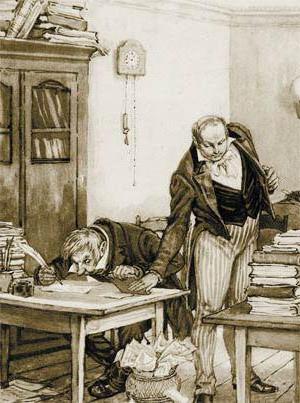The composition on the theme “Dead Souls” by N. V. Gogol can have many variations. The writer's work is so multifaceted that it outgrew itself and made a huge contribution to the development of the Russian literary language. Nikolai Vasilievich’s legacy must be re-read in adulthood, opening up new facets of his talent.
Composition on “Images of Dead Souls”
The work, the genre of which the writer himself described as a poem, was to consist of 3 volumes. Gogol’s creation of “Dead Souls” was inspired by communication with another great Russian writer, A. S. Pushkin. The first volume was written in 1841. The second, according to the servant of the writer, the author burned in a fit of anguish. The third is known only from small notes and short phrases.

The essay on the theme “Dead Souls” can be devoted to the images of the main characters. These are collective portraits of landowners, sellers of "dead souls" who are themselves "living dead." They do not lose their relevance today. Nikolai Vasilievich wanted to depict three main Russian estates: officials, landowners and peasants. But the central place in the poem is still occupied by the landowners: Manilov, Nozdryov, Sobakevich, Plyushkin and Korobochka, from whom the protagonist buys revision souls. The peasants are shown schematically, they are representatives of the mysterious Russian soul. Officials are very similar to landowners, according to the author, they only know how to take bribes.
The main character of Dead Souls is Chichikov
An essay on the theme “Dead Souls” can be started with a description of the protagonist. The central character of the poem is Pavel Ivanovich Chichikov. Until the 11th chapter of the work of N.V. Gogol, it is not known where he comes from and who he is. Readers later learn that the protagonist is from an impoverished noble family. The father did not leave a broken penny to his son, he was only instructed to please his superiors and study diligently, in which he was notably successful. Chichikov is an example of politeness and complaisance, but not honesty. He is driven only by a passion for profit, he has no spiritual guidelines and higher goals.

The character of the protagonist seems amorphous and faceless, but it is precisely these qualities that allow him to reincarnate, become like an interlocutor, manipulate him, guessing what needs to be said in a particular situation. He copies the cloying manner of communication of the landowner Manilov, becomes pious in conversation with Korobochka, tries to adapt to Nozdrev, although he does not tolerate familiar treatment. Chichikov disposes Sobakevich to himself and finds a common language with Plyushkin. Pavel Ivanovich Chichikov has a rare talent as an opportunist.
Composition on the theme "Chichikov - a dead soul"
There is an opinion that this image is a prototype of the Devil himself, who sells souls, a symbol of the coming Apocalypse. Is Chichikov himself dead or alive? There is no consensus. Some believe that the heart of the protagonist is dead, as he seeks only to possess money. Others point to his dreams of creating a family, believing that material gain for him is not an end, but only a means. You can see in Pavel Ivanovich a "new beginning" - an entrepreneur, a representative of the "middle class" who makes money from the air. A whole essay on the topic “Dead Souls” can be devoted to the solution of this question.
Landowners in Dead Souls
All landowners themselves invite Chichikov to their estate, and a panorama of images of feudal society appears before the reader:
- Manilov is an incapable dreamer. He has many undertakings, but not one is brought to the end. All his leisure time is heaps of ash that he knocks out of a pipe.
- Rude Sobakevich, similar to a bear - the opposite of Manilov. He thinks only of material gain that he makes him related to Chichikov.
- A box with a speaking surname is a conservative, her life stopped long ago with the clock in the house, flies fly over her head, symbolizing the death of the soul.
- Nozdryov is a broad, gambling nature who has nowhere to put his energy. In his estate, complete chaos, lives well only for dogs.
- Plyushkin, whose surname has become a common noun for the merchants, is a man divorced from life. He cares only for hoarding, and meaningless.
"Living souls"
Who are the "living souls" in the work of the writer? The irony is that these are the dead peasants of Sobakevich, who were masters of their craft during their lives, as well as fugitives and rebels. They were not passive, unlike gentlemen. But the author still hopes that the dead will be resurrected, that is, the souls of the “living dead” will be reborn. He wanted to talk about this in the second volume.
Is the writer's work relevant for modern Russia? Pupils can conduct a more detailed analysis of this issue if they write an essay on the topic “Dead Souls”. Gogol left a rich literary heritage. The characters of his poem are unspiritual, absorbed in money-grubbing and pursuit of ranks, but not just because their names became common nouns. Unfortunately, Korobochki, Sobakevichi, and Plyushkins are common today. Is it worth talking about the diversity of the Chichikovs?